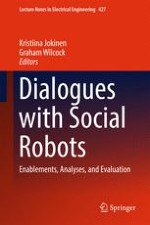2017 | OriginalPaper | Buchkapitel
Is Spoken Language All-or-Nothing? Implications for Future Speech-Based Human-Machine Interaction
verfasst von : Roger K. Moore
Erschienen in: Dialogues with Social Robots
Verlag: Springer Singapore
Aktivieren Sie unsere intelligente Suche, um passende Fachinhalte oder Patente zu finden.
Wählen Sie Textabschnitte aus um mit Künstlicher Intelligenz passenden Patente zu finden. powered by
Markieren Sie Textabschnitte, um KI-gestützt weitere passende Inhalte zu finden. powered by
